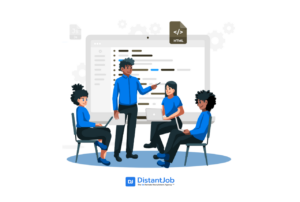Remote work is the present and the future. The pandemic not only taught companies how well their teams perform while working from home, but it also showed a world of new possibilities. A world where companies could hire a dedicated full-time developer working from home at an affordable price!
Now more and more companies are shifting towards a remote and hybrid work model. According to Upwork, millennials and Gen Z workers make up only 38% of the workforce, but in 2028, they’ll increase to 56%.
Despite its prevalence, most people use one word when referring to remote work. If you were to take the Jungian test of Word Association, chances are for “remote worker” you’d say “freelancer.”
That’s a fallacy. Many remote workers are full-time employees who happen to work from an off-site location. What’s more, because of the technology that enables remote work in the first place, the right full-time remote employees are just as much in tune with a project as any in-office employee.
(The Carefree world of) Freelance vs. (the Professional World of) Dedicated Full-time Remote Employee
It’s easy to think that freelance developers are the wave of the future, and for many businesses, they are.
If your company takes on one-off projects that require your developers to have expert knowledge of a specific language or platform, then perhaps freelance is the way to go. You can hire someone temporarily with that skill for the duration of the project and save yourself some extra overhead.
Outside of that one benefit the beauty of freelance work is geared towards the employees. There is no shortage of articles painting the picture of an alluring travel-centric lifestyle where someone occasionally works, when and where they desire. While it might be nice for your freelance developer to work from a milk bar in Osaka, how does your business benefit from it?
Freelancers also benefit from choosing projects/companies to work with – meaning, if they don’t like one, out they go, and you’re stuck having to hire another developer and onboard them.
Freelancers usually work on a project to project basis – and only the work concerns them. Meaning, they aren’t part of your company’s “fabric” – things like work environment, work culture, team spirit don’t interest them. This situation is a quick way to alienate employees and build a wall between you. Not favorable to meaningful business growth.
But freelance isn’t your only option when hiring remotely. The alternative, of course, is dedicated full-time remote developers who work from home.
One essential difference between a freelance developer and a full-time remote developer is that the former works to fuel their other passions; the latter’s passion is their work. I grant you; this is a very harsh take on a tremendously popular recruitment method. But you’ll find from your business’ point of view this to be a fair judgment.
The only thing distinguishing full-time developers working distantly with those working from an office is that they work remotely. In every other aspect, they are similar.
Full-time remote developers are part of a dedicated team that works only on your projects and don’t have to split their attention between your business and another. They are an extension of your office teams who fall in step with your working pace, knows the ins and outs of your business and client expectations, and respects your work culture. Talent Economy concurs that “full-time employee bring better cultural benefit to the organization.”
Because full-time developers are familiar with your company, you don’t have to waste time onboarding them for every project. Moreover, they are in tune with the core ideas of your projects, and you can expect them to see the whole picture and contribute accordingly. And given the familiarity and security of full-time work, you can also expect lower turnaround rate with dedicated developers.
If you need to hire multiple freelancers over an extended period, then you’ll inevitably end up spending more money than if you had full-time developers on your team.
Ways Your Business Can Benefit By Hiring a Work From Home Developer
Developers, even if they are sharing the same workspace, are most likely working online – for which they don’t need to be sitting around together. From project management to communication to cloud sharing software – there are plenty of tools to accommodate virtual teams to do that same work.
The upshot of this reality for your business is tremendous.
1) The World Is Your Limit
First, it means you can hire your best fitting developer from anywhere in the world without worrying about geographic barriers. In turn, you can expect massive cost savings (both due to differences in costs of living and lower administrative costs).
2) Full-time Remote Developers Perform Better Than Onsite Developers
Developers—the dedicated, passionate, borderline OCD ones—do some of their best work in long stretches of time where they get locked into the job, a.k.a, coding sessions. Getting into the “zone” with neighboring chit chat, shrill laughter, smells of a colleague’s lunch is very nearly impossible. At home, they can create the exact environment that is conducive to them personally to do their best work. In the end, you get a higher quality of work.
Does all this mean hiring a full-time remote developer from scratch is risk-free? No, it comes with significant risk – the person you hire may not be the right fit for you at all.
So, what are you to do?
Find Your Full-Time Remote Developer That Works Your Hours with DistantJob
Wouldn’t it be nice if someone did the legwork to find your best developer? Wouldn’t it, in fact, be better if you could get your entire team of developers, remote or otherwise, to work at the same time?
Sounds too good to be true, but we have found that there are developers (no matter where they are in the world) who will work with your home team – during your local time. While most freelance developers are plagued with the digital nomad mindset, these strange creatures worry about getting the job done (no matter the hour).
Of course, as you can imagine, these are elusive beings. They are not freely hanging about the usual job sites. But that shouldn’t be a problem for you. DistantJob has a group of these fantastic beast catchers who will help you find your next developer. Not only can they work at the same time as your in-office team without missing a beat, but they can also do so from their homes.





